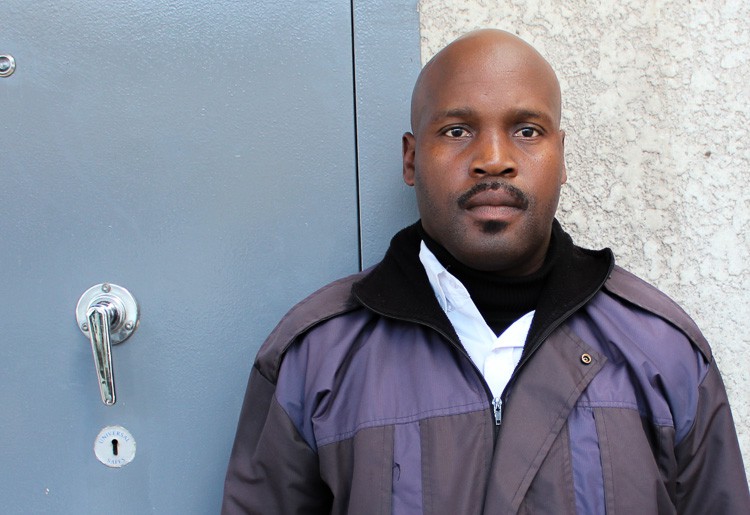Police assault case stuck in NPA
Eastern Cape man says he was accused of stealing fuel and badly beaten
Simphiwe Mkhubata from Whittlesea in the Eastern Cape says he was badly beaten by police four years ago. The Independent Police Investigative Directorate (IPID) investigated the case and sent a docket to the National Prosecuting Authority, but no one has been prosecuted.
Mkhubata was working as a guard for security company Qauka in September 2014. The company was contracted to guard what was then the Lukhanji municipal office (now known as Enoch Mgijima) in Whittlesea.
“I was working night shift from 6pm to 6am. The municipality had its own security guards who worked from 8am till 4:30pm … I did my job as usual. I patrolled the building now and then. I would take a small break to go to the guard room,” he said.
“At 4am as I was patrolling I noticed that a gate was open, and the chain and lock were missing,” said Mkhubata. He looked around the building but didn’t see anyone.
“I called my boss and the guard who was going to work the morning shift to inform them,” said Mkhubata.
He said municipal manager Bongani Mngese and Qauka owner Kaizer Tom arrived and unlocked a shipping container used for storage. They confirmed this with GroundUp. They found that a wheelbarrow and brooms were missing. There was a hole in the top of the container. Diesel fuel was missing from a truck.
A month later, on 15 October, Mkhubata said a police officer who was investigating the case, summoned him to the Whittlesea police station.
According to Mkhubata he had to wait for five hours, before he was called into a room with three police officers (whose surnames are known to GroundUp). He was handcuffed. His face was covered with plastic and he was beaten for four hours.
“One told me that a municipal official had told him that I stole the diesel and the missing tools. I denied that. I asked him who told him, but he refused to tell me, saying he did not like my attitude … They started attacking me. They told me that this is what they do to thieves.”
“They even kicked me on my private parts. They beat me until I could not feel any pain. One officer would beat me then removed the plastic on my face to give me air to breathe then continue again,” said Mkhubata.
“They left me in so much pain. I was peeing blood,” he said.
Mkhubata said he was held in police cells for two days without any medication. Then he was released because there was no evidence against him.
“I asked to be taken to hospital but they laughed at me,” he said.
The following week he had tried to open an assault case at Whittlesea police station, but police officers told him he would have to wait.
In January 2015, he wrote to President Jacob Zuma through Parliament. Mkhubata said he had written more than ten letters to Parliament, and in April this year he had received a response from acting secretary to Parliament Penelope Tyawa, who said that his letter had been sent to IPID.
In March he had already approached IPID himself, only to be told, he said, that he must first open an assault case at Whittlesea police station. After another failed attempt to open a case at the police station, he contacted IPID again. An IPID investigating officer called the police station manager and Mkhubata was at last able to open a case.
Ipid collected the docket and started the investigation.
Mkhubata showed GroundUp a doctor’s note describing his injuries which he submitted to IPID. But, he said, after the IPID investigation was complete, the investigating officer had told him the prosecutor was holding onto the docket instead of charging the police officers with assault.
“I struggled to open this case for two years, with cops refusing to take my case. They are forcing me to forget about the case, meaning these cops are getting away with this,” said Mkhubata.
IPID spokesperson Moses Dlamini confirmed to GroundUp that an assault charge laid by Mkhubata against three Whittlesea police officers had been investigated.
“After a case is open, an investigative officer takes a docket to the senior prosecutor to decide if the case should go to court or not. In this case a docket was taken to the senior prosecutor and the investigating officer told me that the prosecutor is refusing to make a decision about the case and he does not know why,” said Dlamini.
GroundUp asked the National Prosecuting Authority (NPA) what had happened to the case. NPA Head of Communications Bulelwa Makeke said she could only assist if the investigating officer on the case could confirm that the matter had been investigated and taken to the NPA.
At her suggestion, GroundUp sent the name and contact details of the IPID investigating officer to NPA Eastern Cape regional spokesperson Tsepo Ndwalaza on 4 September and followed up on 13 September. On 14 September, Ndwalaza responded: “I have forwarded your enquiry to the relevant people and I have not received any feedback.”
GroundUp contacted Ndwalaza again by email on 27 September and on 9 October but we have not received any further response.
Support independent journalism
Donate using Payfast

© 2018 GroundUp.
This article is licensed under a Creative Commons Attribution-NoDerivatives 4.0 International License.
You may republish this article, so long as you credit the authors and GroundUp, and do not change the text. Please include a link back to the original article.

